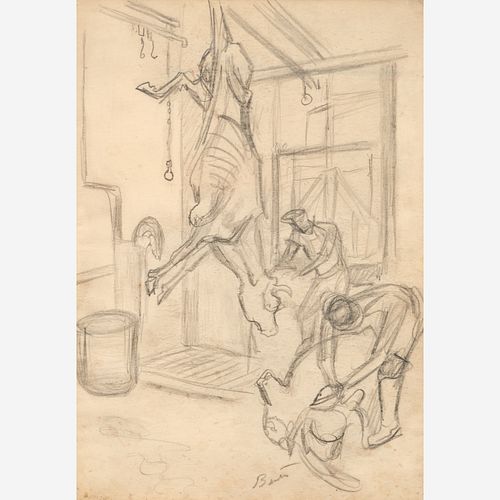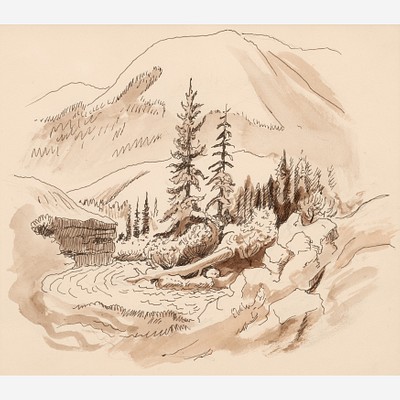Thomas Hart Benton "Study of Processing Cows, KC Stockyards" Graphite (1935-36)
Two ways to bid:
- Leave a max absentee bid and the platform will bid on your behalf up to your maximum bid during the live auction.
- Bid live during the auction and your bids will be submitted real-time to the auctioneer.
Bid Increments
| Price | Bid Increment |
|---|---|
| $0 | $25 |
| $500 | $50 |
| $1,000 | $100 |
| $5,000 | $250 |
| $10,000 | $500 |
| $20,000 | $1,000 |
| $50,000 | $2,500 |
| $75,000 | $5,000 |
| $100,000 | $10,000 |
About Auction
Dec 2, 2023
This collection of 113 original works by Thomas Hart Benton was assembled by longtime friend and artist, Vincent Campanella. The collection showcases Benton's working process, with many works being studies for murals and paintings now hanging across the US from The Met to the Nelson-Atkins. Circle Auction info@circle-auction.com
- Lot Description
Thomas Hart Benton
(Missouri, 1889-1975)
Study of Processing Cows, Kansas City Stockyards, circa 1935-36
Graphite on paper
11 1/2" x 8"
Benton scholar Dr. Henry Adams: "Benton used this sketch of the Kansas City stockyards for the Kansas City panel of his Missouri mural. There he juxtaposed this slaughterhouse scene with a rendering of well-dressed people entering the Nelson-Atkins Museum of Art. Benton clearly intended to contrast the elegant and not-so-elegant sides of Kansas City life. Perhaps he also intended to suggest that the wealth that created the museum was provided by the hard, bloody work carried out down in the stockyards.
"Kansas City emerged as a major center in the late 1860s, when Colonel Kersey Coates, who had moved there to represent a group of Philadelphia investors, persuaded the Hannibal and St. Joe railroad to build a bridge in Kansas City rather than Leavenworth, as they originally intended. Completed in 1869, the same year that the Golden Spike united the railways of east and west, this was the first bridge across the Mississippi River, and it established Kansas City as the hub of seven major railroad lines.
"The first major business to take advantage of this opportunity was the Kansas City Stockyards. Seeing that Kansas City was the junction closest to the cattle ranches of the western plains, a syndicate from Boston, led by Charles Francis Adams, Jr., took over the Kansas City stockyards in 1879, and in a few years expanded it from a modest operation to one which outstripped all other live-stock markets of the country, with the one exception of Chicago, with which it became a close competitor.
"Given the importance of the stockyards to the history of Kansas City, it was natural for Benton to include a scene of them in his mural. But his choice of such a crude subject offended many local boosters, who would have preferred more genteel imagery."
Signed to the bottom right. Housed in a glazed frame measuring 20 3/4" x 16 1/2".
Dimension
Height: 20.75 inWidth: 16.50 inDepth: 1.50 inDepth: 1.50 inCondition
Good to fair condition. Creases at the bottom right corner and horizontally near the top. Rippling to the sheet, and small scattered staining.
- Provenance
Acquired by Vincent and Leah Campanella directly from Thomas and Rita Benton over the course of their 25 year friendship. A portion of the collection was given to the Campanellas by Rita in 1975 as compensation for Vincent completing "The Sources of Country Music," the mural left unfinished when Tom passed away in 1975. Vincent Campanella was later prominently featured in the Ken Burns documentary Thomas Hart Benton (1988). In 2001, the Campanella family sold the collection to the current owner, a private Kansas City collector.
Benton scholar and author, Dr. Henry Adams, has authenticated the entire collection in person. You can find his essay documenting the 25 year tumultuous friendship of Vincent and Thomas and the origins of the collection at Circle-Auction.com. A copy of his essay will be provided to all winning bidders.
- Shipping Info
-
Pick Up, Packing, & Shipping: Winning bidders may pick up their lots, once paid in full, at Circle’s auction office during regular business hours. If packing and shipping is required, we can provide you with a list of recommended shippers by request. You will be responsible to contact, arrange shipment, and pay 3rd party shippers. Circle will not be responsible for loss or damage of purchased lots handled or shipped, nor for acts and omissions, by 3rd party shippers, whether recommended by us or not. Circle will not release the lot for shipment until payment has been made in full and a buyer’s written shipping authorization form has been received. Winning bids may not be retracted, canceled or rescinded due to issues with shipping including, but not limited to, costs or prohibitions. It is the responsibility of the bidder to account for shipping prior to bidding. Failure to Pick Up & Storage: Winning bidders must pick up or have lots shipped within 15 calendar days of the close of the auction. On the 16th day from the close of the auction Circle has the right to charge the winning bidder a storage fee of $5 per lot per day. Lots that have been paid for, but remain on our premises sixty (60) days from the close of the auction may be sold by Circle, with no notice to the buyer. Any funds in excess of the purchase price, commissions, applicable costs, and storage fees will be remitted to the original winning bidder. At the point where storage fees associated with an unshipped item exceed the hammer price of the item the winning bidder will be considered in default of our terms and conditions and forfeits ownership to Circle Auction or its affiliated companies. In the case where the item is forfeited the winning bidder will not be compensated in any way. Lots left with Circle after the 16th day from the close of the auction are stored at the buyer’s risk. If you have any questions regarding these terms please contact Circle Auction by email at : Info@Circle-Auction.com
-
- Payment & Auction Policies
-
Available payment options
-
-
- Buyer's Premium



 EUR
EUR CAD
CAD AUD
AUD GBP
GBP MXN
MXN HKD
HKD CNY
CNY MYR
MYR SEK
SEK SGD
SGD CHF
CHF THB
THB

























